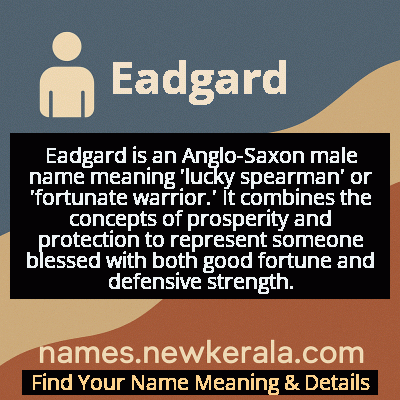Eadgard Name Meaning & Details
Origin, Popularity, Numerology Analysis & Name Meaning of Eadgard
Discover the origin, meaning, and cultural significance of the name EADGARD. Delve into its historical roots and explore the lasting impact it has had on communities and traditions.
Name
Eadgard
Gender
Male
Origin
Anglo
Lucky Number
4
Meaning of the Name - Eadgard
Eadgard is an Anglo-Saxon male name meaning 'lucky spearman' or 'fortunate warrior.' It combines the concepts of prosperity and protection to represent someone blessed with both good fortune and defensive strength.
Eadgard - Complete Numerology Analysis
Your Numerology Number
Based on Pythagorean Numerology System
Ruling Planet
Uranus (Rahu)
Positive Nature
Strong sense of order, loyal, practical, and disciplined.
Negative Traits
Stubborn, overly serious, rigid, and prone to feeling restricted.
Lucky Colours
Blue, gray.
Lucky Days
Saturday.
Lucky Stones
Blue sapphire.
Harmony Numbers
1, 7, 8.
Best Suited Professions
Managers, engineers, accountants, organizers.
What People Like About You
Dependability, discipline, practicality.
Famous People Named Eadgard
Eadgar the Peaceful
King of England
Ruled England during a period of stability and reform from 959-975 AD
Eadgar Ætheling
Anglo-Saxon prince
Last male member of West Saxon royal house, briefly proclaimed king in 1066
Eadgar of Scotland
Scottish prince
Key figure in 11th-12th century Anglo-Scottish political relations
Name Variations & International Equivalents
Click on blue names to explore their detailed meanings. Gray names with will be available soon.
Cultural & Historical Significance
Extended Personality Analysis
The name Eadgard suggests a personality characterized by strength, reliability, and an almost innate sense of good fortune. Individuals with this name are often perceived as natural leaders who combine practical wisdom with decisive action. They tend to be protective of those in their care while also attracting prosperity and success in their endeavors. The spear element of the name indicates directness, courage, and the ability to take decisive action when needed, while the fortune element suggests someone who seems blessed with good timing and favorable outcomes. Eadgards typically exhibit a balanced temperament—they can be assertive when necessary but are generally thoughtful and measured in their approach. They often possess a strong sense of tradition and history, drawing strength from their heritage while navigating modern challenges. This combination makes them particularly effective in roles requiring both strategic thinking and practical implementation. Their personality reflects the ancient ideal of the fortunate warrior—someone who not only faces challenges head-on but does so with the confidence that comes from both skill and serendipity.
Modern Usage & Popularity
In contemporary naming practices, Eadgard (most commonly encountered as Edgar) occupies a distinctive niche as a traditional name with historical depth. While never achieving mass popularity in modern times, it maintains a steady presence, particularly among families with English heritage or those seeking names with strong historical and literary connections. The spelling 'Eadgard' is quite rare and is primarily used in historical contexts or by enthusiasts of Anglo-Saxon culture, while 'Edgar' remains the standard modern form. The name experienced a Victorian revival during the 19th century's medievalism movement and has seen occasional resurgences, most recently as part of the broader trend toward vintage and traditional names. It's particularly favored by parents looking for a name that is both distinctive and meaningful, offering a connection to English history without being overly common. Current usage trends show it as an uncommon but respected choice that conveys sophistication, strength, and tradition.
Symbolic & Spiritual Meanings
Symbolically, Eadgard represents the powerful combination of protective strength and providential fortune. The spear element symbolizes defense, direct action, courage, and the ability to overcome obstacles through focused effort. It represents the warrior spirit—not necessarily in a literal military sense, but as a metaphor for facing life's challenges with determination and skill. The fortune element adds a layer of divine favor, suggesting that the individual not only possesses the strength to confront difficulties but also enjoys the blessing of favorable circumstances and timely opportunities. This creates a rich symbolic meaning of the 'fortunate protector'—someone who safeguards what matters while also attracting prosperity and success. The name embodies the ideal of balanced power: the ability to be both strong and blessed, assertive and successful. In a broader spiritual sense, Eadgard symbolizes the belief that true strength is most effective when combined with good fortune, creating a holistic approach to life's challenges that honors both human effort and serendipitous blessing.

